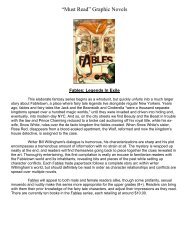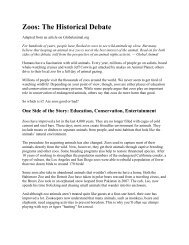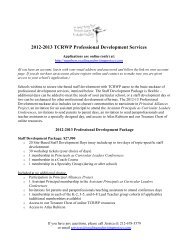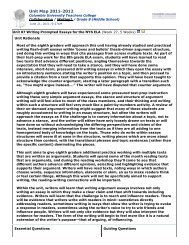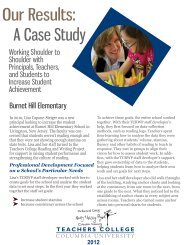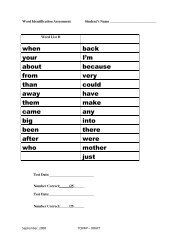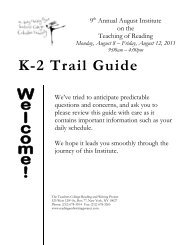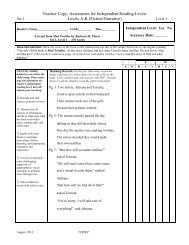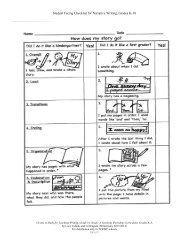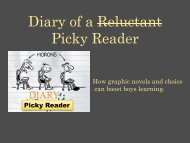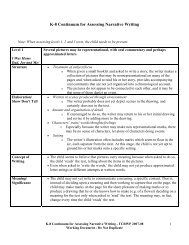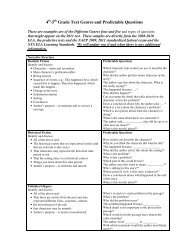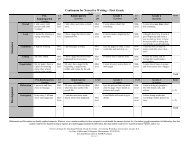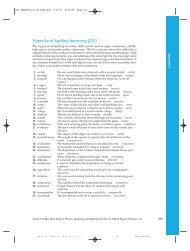2nd Grade Writing Unit 01 Launching with Nonfiction - The Reading ...
2nd Grade Writing Unit 01 Launching with Nonfiction - The Reading ...
2nd Grade Writing Unit 01 Launching with Nonfiction - The Reading ...
You also want an ePaper? Increase the reach of your titles
YUMPU automatically turns print PDFs into web optimized ePapers that Google loves.
<strong>Writing</strong> Curricular Calendar, Second <strong>Grade</strong>, 2<strong>01</strong>1-2<strong>01</strong>2 12cooking) is the very best it can be. By Nancy Schroeder, Gregory, Marc Morrison, andAndrea Bodley (Sample Minilesson F)• Today, writers, I want to teach you that not only can you revise using strips and flaps toadd into your booklets, but also by trying a second draft! You might rewrite your entirebook or chapter inside your book. You could start from scratch, maybe <strong>with</strong> a new titleor idea, and rewrite your book or chapter, putting more power behind your words..• Today I want to teach you when we are trying to write books that we want others tolearn from, we can turn to books that we have learned from to notice what those writersdid, and we can use their writing to make our writing better.Bend IV: Preparing for Publication• Today I want to teach you that as you revise your best book you have to really think,“What else do I need to include in my book to help teach others and to show that I reallycare about my topic?” One thing you can do is meet <strong>with</strong> your writing partner to actuallyteach the information. <strong>The</strong>n you will see how your partner responds. We need to beprepared to respond to questions that our partners might have around our topic.◦ Tip: Your partner will be listening and asking questions like, “But I don’tunderstand. What do you mean?” or “Why is this important?” This will help younotice what other information to include!• Today I want to teach you that writers reread our writing like detectives. We search forwords that need to be fixed up and spelled better. As second graders, you already knowof many tools that can help you to do this. You can use the Word Wall, charts in theroom, what you already know about vowel patterns and chunks or you might even turnto books about your topic to help you spell words the best that you can.• Writers use punctuation as we write to give directions to our readers when our thoughtor action ends and when a new one begins. When we edit our writing we will want tolook at how we used punctuation to make sure that our thoughts and ideas are clear tothe reader. Today I want to teach you to read your work carefully—like adetective—thinking about what changes you need to make.◦ Tip: Remember that a sentence is a thought. At the end of that thought is aperiod. <strong>The</strong> next thought begins <strong>with</strong> a capital letter. As we reread our work weread on the hunt for parts that we want to edit—and we use punctuation in abetter and clearer way.Sample Minilesson ABy Lucy CalkinsConnectionWriters, you must be feeling so grown up. Do any of you remember the first time you ever cameto school and you weren’t sure where to go, or what to do? You were probably standing there,thinking, “Where do I go?” “What do I do?” It must feel so different this year, right? How manyof you, when you got off the bus, had to just stand there and ask, ‘What do I do?” “Where do Igo?” Well, right now we are starting our writing workshop and I have HUGE news to tell you.This is it. You already know what to do. And you don’t have to sit there and ask, “What do I<strong>Unit</strong> One – <strong>Launching</strong> <strong>with</strong> <strong>Nonfiction</strong><strong>Reading</strong> and <strong>Writing</strong> Project, 2<strong>01</strong>1 ©DRAFT



